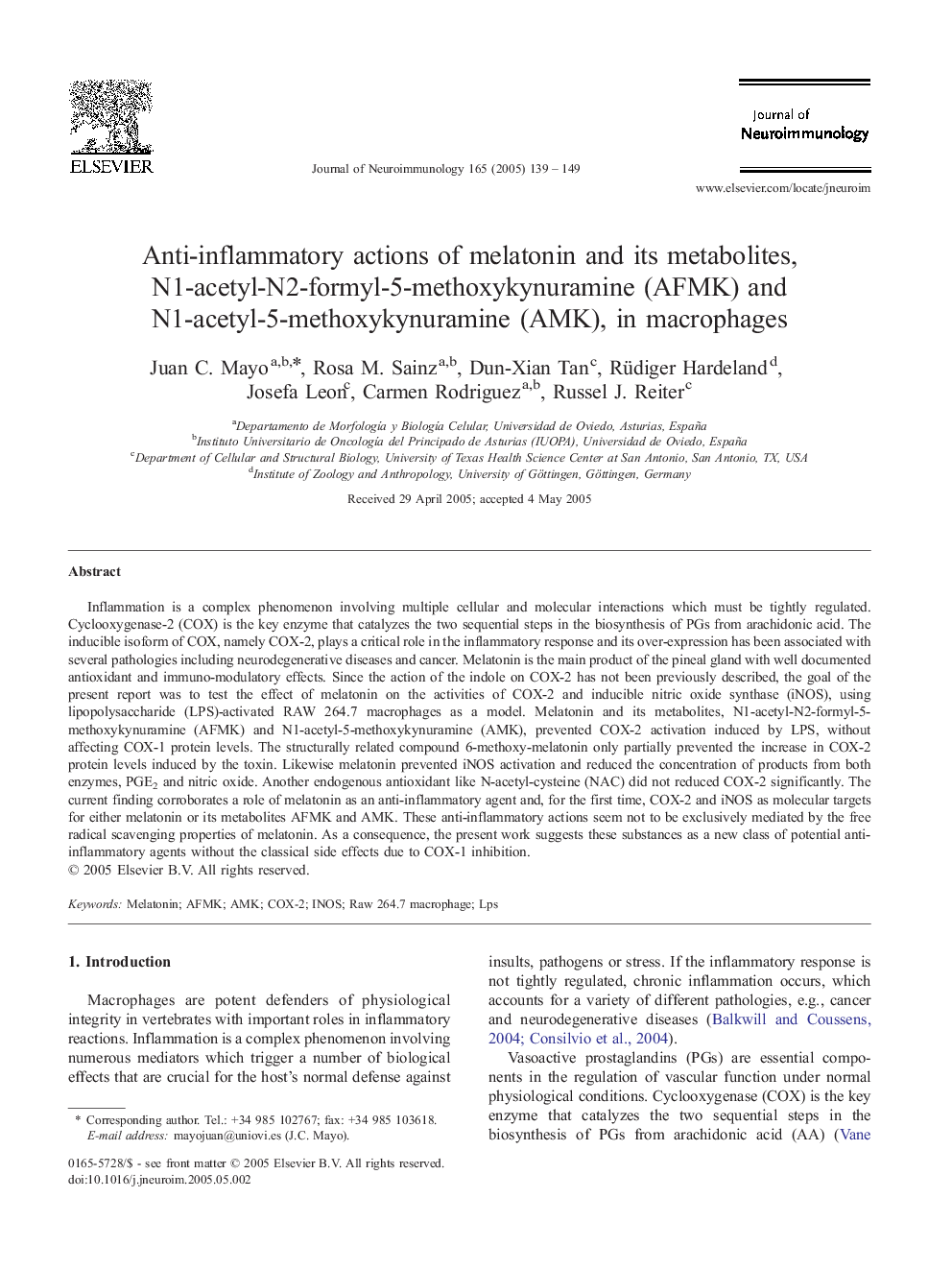| کد مقاله | کد نشریه | سال انتشار | مقاله انگلیسی | نسخه تمام متن |
|---|---|---|---|---|
| 9194713 | 1580505 | 2005 | 11 صفحه PDF | دانلود رایگان |
عنوان انگلیسی مقاله ISI
Anti-inflammatory actions of melatonin and its metabolites, N1-acetyl-N2-formyl-5-methoxykynuramine (AFMK) and N1-acetyl-5-methoxykynuramine (AMK), in macrophages
دانلود مقاله + سفارش ترجمه
دانلود مقاله ISI انگلیسی
رایگان برای ایرانیان
موضوعات مرتبط
علوم زیستی و بیوفناوری
ایمنی شناسی و میکروب شناسی
ایمونولوژی
پیش نمایش صفحه اول مقاله

چکیده انگلیسی
Inflammation is a complex phenomenon involving multiple cellular and molecular interactions which must be tightly regulated. Cyclooxygenase-2 (COX) is the key enzyme that catalyzes the two sequential steps in the biosynthesis of PGs from arachidonic acid. The inducible isoform of COX, namely COX-2, plays a critical role in the inflammatory response and its over-expression has been associated with several pathologies including neurodegenerative diseases and cancer. Melatonin is the main product of the pineal gland with well documented antioxidant and immuno-modulatory effects. Since the action of the indole on COX-2 has not been previously described, the goal of the present report was to test the effect of melatonin on the activities of COX-2 and inducible nitric oxide synthase (iNOS), using lipopolysaccharide (LPS)-activated RAW 264.7 macrophages as a model. Melatonin and its metabolites, N1-acetyl-N2-formyl-5-methoxykynuramine (AFMK) and N1-acetyl-5-methoxykynuramine (AMK), prevented COX-2 activation induced by LPS, without affecting COX-1 protein levels. The structurally related compound 6-methoxy-melatonin only partially prevented the increase in COX-2 protein levels induced by the toxin. Likewise melatonin prevented iNOS activation and reduced the concentration of products from both enzymes, PGE2 and nitric oxide. Another endogenous antioxidant like N-acetyl-cysteine (NAC) did not reduced COX-2 significantly. The current finding corroborates a role of melatonin as an anti-inflammatory agent and, for the first time, COX-2 and iNOS as molecular targets for either melatonin or its metabolites AFMK and AMK. These anti-inflammatory actions seem not to be exclusively mediated by the free radical scavenging properties of melatonin. As a consequence, the present work suggests these substances as a new class of potential anti-inflammatory agents without the classical side effects due to COX-1 inhibition.
ناشر
Database: Elsevier - ScienceDirect (ساینس دایرکت)
Journal: Journal of Neuroimmunology - Volume 165, Issues 1â2, August 2005, Pages 139-149
Journal: Journal of Neuroimmunology - Volume 165, Issues 1â2, August 2005, Pages 139-149
نویسندگان
Juan C. Mayo, Rosa M. Sainz, Dun-Xian Tan, Rüdiger Hardeland, Josefa Leon, Carmen Rodriguez, Russel J. Reiter,